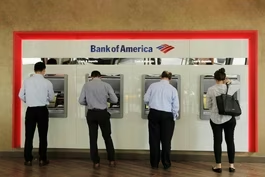
Why so many Americans are dissatisfied with a solid economy
Clip: 12/3/2024 | 7m 33sVideo has Closed Captions
Why so many Americans are dissatisfied with the seemingly solid economy
There is a disconnect between seemingly solid economic numbers and the way people feel about this economy. Voters clearly were upset about the cost of living and that helped elect Donald Trump to a second term. Economics correspondent Paul Solman reports from Ohio on how Americans see this in the wake of the election.
Problems playing video? | Closed Captioning Feedback
Problems playing video? | Closed Captioning Feedback
Major corporate funding for the PBS News Hour is provided by BDO, BNSF, Consumer Cellular, American Cruise Lines, and Raymond James. Funding for the PBS NewsHour Weekend is provided by...

Why so many Americans are dissatisfied with a solid economy
Clip: 12/3/2024 | 7m 33sVideo has Closed Captions
There is a disconnect between seemingly solid economic numbers and the way people feel about this economy. Voters clearly were upset about the cost of living and that helped elect Donald Trump to a second term. Economics correspondent Paul Solman reports from Ohio on how Americans see this in the wake of the election.
Problems playing video? | Closed Captioning Feedback
How to Watch PBS News Hour
PBS News Hour is available to stream on pbs.org and the free PBS App, available on iPhone, Apple TV, Android TV, Android smartphones, Amazon Fire TV, Amazon Fire Tablet, Roku, Samsung Smart TV, and Vizio.
Providing Support for PBS.org
Learn Moreabout PBS online sponsorshipLet's take a closer look now at this disconnect between what our solid economic numbers and the way many people say they feel about this economy.
Voters said they were upset about the cost of living and that helped elect Donald Trump to a second term.
Our economics correspondent Paul Solman reports now from Ohio on how many Americans see this in the wake of the election.
Outside a Kroger in Delphi Township, Ohio, where almost 70% of voters went for Donald Trump.
How's the economy for you?
It's horrible.
It is bad enough for a lot of people.
I think everyone could be doing a little bit better right now.
In exit polls, more than 6 in 10 voters rated the economy as not so good or poor.
69% of them cast their vote for Trump.
That's despite slowing inflation, solid growth and low unemployment, says Columbia's Adam Tyus.
It's really the most dramatically successful recovery the United States has possibly ever seen from the kind of shock that we saw in 2020.
But it doesn't translate down to a simple experience of well-being for very large numbers of people.
The economy currently is not working for me and my family.
Single mother Esther Wells voted for Hillary Clinton in 2016.
Trump in 2020.
This year, she says, the economy kept her with Trump.
Some of the rhetoric that came out to black people and minorities you this is your chance to vote for the first black woman.
And to me, it was like, that is not my number one issue.
How are you going to make things better for my family?
It was about affordability of food, of gas, of heating energy.
Like Wells, many Americans are comparing the cost of living to what it was four years ago and blaming inflation.
Technically, inflation is the rate of price change over time, and that annual rate has slowed, but they are looking at the long term climb.
Inflation is when things are too expensive or inflation is when I can no longer afford anything.
That's what people reported to Harvard's Stefanie Sun Sheva and surveys she conducted about inflation.
That their wages are just not keeping up with prices.
Especially in the service industry.
I'm in the food industry $15 an hour, and that's impossible.
Inflation really triggers a sense of injustice and inequity because lots of people will say that the wages of higher income people are much better able to keep pace with prices.
Outside Kroger, grocery prices were a common gripe four years ago.
If you go to Kroger's, it'll cost more than $25 and that was cost very close to $200.
The prices are just skyrocketing and I'm paying double what I was paying.
A few.
Years ago.
So yeah, it's horrible.
Grocery prices are up some 25% since the pandemic, but just 1.1% from a year ago.
It's not just groceries, though.
A couple of years ago, I could just, like, kind of do my own thing and make my money, pay my bills, have extra to do, find stuff Now I can't.
You know, you're putting all your money into rent bills and whatnot, and it's just hard.
I have two young children.
Daycare prices continue to rise, and without any assistance, it has become a challenge.
Higher interest rates have added to the cost of living, says Jason Newell, but aren't even counted in the official inflation rate.
I saw a statement from American Express 28.9%.
It's criminal.
It is almost untenable for millennials like myself, young families in our 30s who have good jobs to be able to buy into a starter home.
To go and purchase a car using an auto loan.
Or if you want to purchase a house with a mortgage.
Those are costs that people consider to be part of their cost of living, yet they're not reflected in these inflation numbers that we see.
Inflation has slowed over the last two years, says Tyus.
But during peak Covid.
If you got into trouble financially in that period, if you were stressed, if you ended up running up an overdraft or your credit card bills, you're still dealing with the pain that you felt in that period and the anxiety that you felt there.
And you'll compare this with how you felt between 2017 and early 2020 before Covid.
And you'll realize that in that period under Donald Trump, the first time around, you felt like you were doing better every single week.
Even if you weren't.
But that's how lots of folks feel.
Our economy was a lot better there.
Like I could eat and I could do stuff.
So I seem to be on the uptick.
And then Biden took over.
And when.
It went down after Biden took over.
Inflation tends to leave really lasting impacts on people, both because they had to make true adjustments to it and also emotionally.
And I think this episode is definitely leaving some scars.
So when we asked people about their experiences, they're not just reporting what they think has happened in the couple of months before that or even the year before that.
But really what has happened over this whole inflationary episode.
And former Treasury Secretary Larry Summers recently pointed out that higher prices affect everyone.
If you have extra unemployment, it's 2% of people who don't have jobs.
And if you have extra inflation, it's 100% of people who see higher prices.
So many of whom already resent long term real wage stagnation.
Moreover, people.
Get a 7% raise and their 7% price increases.
They don't say to themselves, well, there's kind of zero real wage.
They say to themselves, I did a fantastic job and I got a seven.
10% increase.
And it all got taken away from me by inflation.
So who do folks blame?
People do mention the government as a major cause of inflation.
People say I feel a lot of anger, a lot of fear.
And when we ask them who this anger is directed at, lots of people, said the government.
But economist Carol Binder says that for many, inflation is mainly a label.
I think for a lot of people, inflation can be a catchall for just a bad economy or economic uncertainty.
And in her research, binder found that people's perceptions.
Were influenced by their politics.
When they're of the same political party as the president.
They expect lower inflation.
And when they have the opposite party of the president, they expect higher inflation.
During the Biden administration, that partizan gap and expectations of inflation got a lot bigger.
So as inflation started really rising in 2021 and 2022, Democrats still expected inflation to be about the same as they had before.
But Republicans inflation expectations rose a lot.
So now you've got inflation on top of inflation.
I don't see a big end in sight.
We also saw that that's probably due to differences in how the media was reporting on inflation.
The Biden administration has been calling it transitory, in other words, short term, not permanent.
Whether the media was saying that it was going to be transitory or that it was going to be something longer lasting.
Binder's work was done well before Election Day.
But in retrospect, her result should have been a warning for the Democrats.
If you look at the expectations of independents, we saw that they were actually closer to the expectations of Republicans.
You could look back at it and say, well, a lot of independents did seem as worried about inflation nearly as Republicans.
We're about to see how they'll feel if the cost of living doesn't return to pre-COVID levels or worse, starts rising faster.
Once more, The PBS NewsHour.
Paul Solman.
Bank of America CEO on economy and Trump's second term
Video has Closed Captions
Clip: 12/3/2024 | 9m 28s | Bank of America CEO on interest rates, tariffs and Trump's second term (9m 28s)
South Korea in political chaos with martial law attempt
Video has Closed Captions
Clip: 12/3/2024 | 7m 43s | South Korea's president throws nation into political chaos with martial law attempt (7m 43s)
Syrians describe living in crossfire of brutal civil war
Video has Closed Captions
Clip: 12/3/2024 | 7m 23s | Syrians describe living in the crossfire of a brutal civil war for 13 years (7m 23s)
What Trump’s return to power will mean for Jan. 6 rioters
Video has Closed Captions
Clip: 12/3/2024 | 6m 19s | What Trump’s return to power will mean for Jan. 6 rioters (6m 19s)
Providing Support for PBS.org
Learn Moreabout PBS online sponsorship
- News and Public Affairs

FRONTLINE is investigative journalism that questions, explains and changes our world.

- News and Public Affairs

Amanpour and Company features conversations with leaders and decision makers.












Support for PBS provided by:
Major corporate funding for the PBS News Hour is provided by BDO, BNSF, Consumer Cellular, American Cruise Lines, and Raymond James. Funding for the PBS NewsHour Weekend is provided by...




